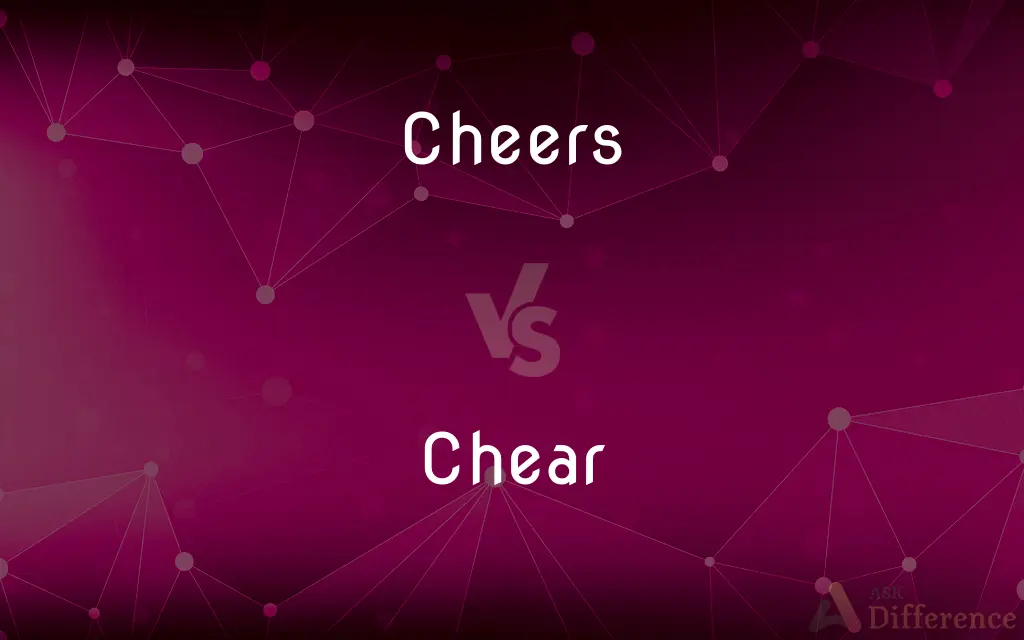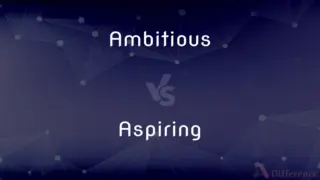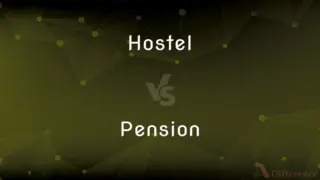Cheers vs. Chear — What's the Difference?
By Maham Liaqat & Fiza Rafique — Updated on March 30, 2024
Cheers is a term used to express good wishes, gratitude, or celebration, while Chear is an archaic spelling rarely used in modern English.

Difference Between Cheers and Chear
Table of Contents
ADVERTISEMENT
Key Differences
Cheers is commonly used in English-speaking countries as a way to toast during celebrations, express gratitude, or convey encouragement. It has various applications, from casual farewells to expressions of support. On the other hand, Chear is an archaic form of the word "cheer" and is not commonly used in contemporary language. Its usage was more prevalent in older English texts and has since been replaced by the modern spelling "cheer".
Cheers can also function as a noun, referring to the act of cheering or the shouts and applause of a crowd, highlighting moments of happiness or approval. Chear, in its historical context, might have served a similar purpose but is now considered outdated and is rarely seen outside of historical or literary discussions.
In digital communication, "Cheers" is often used to close messages or emails in a friendly, informal manner, conveying a sense of warmth or goodwill. Chear, due to its obscurity, does not find a place in modern digital or written exchanges.
The plural form "cheers" implies multiple instances of cheer or multiple people expressing joy or approval, emphasizing a collective or communal aspect. In contrast, the archaic "chear" lacks contemporary usage, making its application in modern plural or singular contexts virtually nonexistent.
The evolution of language has seen "cheers" remain relevant and versatile, adapting to various social and communicative contexts. Chear, on the other hand, serves as a linguistic artifact, highlighting the dynamic and changing nature of language over time.
ADVERTISEMENT
Comparison Chart
Usage
Modern, widespread
Archaic, rare
Context
Toasts, gratitude, digital communication
Historical texts, archaic discussions
Form
Noun and interjection
Archaic form of "cheer"
Plurality
Used in both singular and plural forms
Singular form, with no modern plurality
Relevance
Remains relevant in contemporary language
Largely obsolete and not used
Compare with Definitions
Cheers
Gratitude or thanks.
Cheers for helping me out.
Chear
Old literary use.
Shakespeare often used words like 'chear' in his plays.
Cheers
Encouragement or support.
Cheers to you for trying your best.
Chear
Historical context of happiness.
In his diary, he wrote of the 'chear' felt during the harvest.
Cheers
Farewell or goodbye.
I have to go now, cheers!
Chear
Archaic spelling of cheer.
The old text spoke of 'chear' and merriment.
Cheers
Expression of good wishes.
Cheers to your new job!
Chear
Rare usage in modern English.
You might find 'chear' in historical novels.
Cheers
A toast during celebrations.
Everyone raised their glasses and said, 'Cheers!'
Chear
Reflecting on language evolution.
Studying 'chear' shows how English has evolved over centuries.
Cheers
Cheers is an American sitcom television series that ran on NBC from September 30, 1982, to May 20, 1993, with a total of 275 half-hour episodes across eleven seasons. The show was produced by Charles/Burrows Productions in association with Paramount Network Television, and was created by the team of James Burrows and Glen and Les Charles.
Chear
Obsolete form of cheer
Cheers
Used as a toast or valediction.
Chear
See Cheer.
Cheers
Chiefly British Used as an expression of thanks.
Cheers
To say "cheers" as a toast.
Cheers
Plural of cheer
Cheers
A common toast used when drinking in company.
Cheers
Goodbye, especially as a sign-off in an email or after writing a comment.
Cheers
Thank you
Common Curiosities
Is chear ever correct to use in modern English?
Chear is considered archaic and is not used in standard modern English, except in historical or literary contexts.
How has the spelling of cheer evolved?
The spelling of "cheer" has evolved from its archaic form "chear" to its current spelling, reflecting changes in language use over time.
What is the difference between cheers and chear?
Cheers is a modern, commonly used term for expressing good wishes or gratitude, while Chear is an outdated spelling of cheer, rarely used today.
Can cheers be used in formal communication?
While typically informal, "cheers" can be used in semi-formal communications, especially in British English, as a sign-off in emails.
Why is chear no longer used?
Chear fell out of use as language evolved, and the standardized spelling became "cheer."
What are some occasions when you might use "cheers"?
Cheers is used during toasts, as a sign of gratitude, in casual farewells, or as encouragement.
Is "cheers" specific to any English dialect?
"Cheers" is used widely in English-speaking countries, but its usage as a sign-off is particularly common in British English.
Can "cheers" be considered a slang term?
"Cheers" can be informal, but it's not typically considered slang. Its use is widely accepted in various settings.
How do digital communications affect the usage of "cheers"?
In digital communications, "cheers" is often used informally to convey friendliness or gratitude at the end of messages.
Are there any similar words to chear in modern English?
While "chear" itself is outdated, its modern equivalent "cheer" carries its essence in contemporary usage.
Can cheers be used as both a noun and a verb?
Yes, "cheers" can be used as a noun to refer to expressions of good wishes or as an interjection.
What does the persistence of "cheers" in language tell us?
The persistence of "cheers" illustrates its versatility and adaptability across various contexts and generations.
How do cultural differences influence the use of "cheers"?
Cultural differences can influence the contexts in which "cheers" is used, such as in toasting traditions or expressions of thanks.
What role does "cheers" play in social gatherings?
In social gatherings, "cheers" often serves as a communal expression of goodwill, celebration, or solidarity.
How do historical texts using "chear" contribute to our understanding of past language use?
Historical texts using "chear" provide insights into the linguistic preferences and societal norms of past eras, highlighting the evolution of language.
Share Your Discovery

Previous Comparison
Ambitious vs. Aspiring
Next Comparison
Hostel vs. PensionAuthor Spotlight
Written by
Maham LiaqatCo-written by
Fiza RafiqueFiza Rafique is a skilled content writer at AskDifference.com, where she meticulously refines and enhances written pieces. Drawing from her vast editorial expertise, Fiza ensures clarity, accuracy, and precision in every article. Passionate about language, she continually seeks to elevate the quality of content for readers worldwide.














































